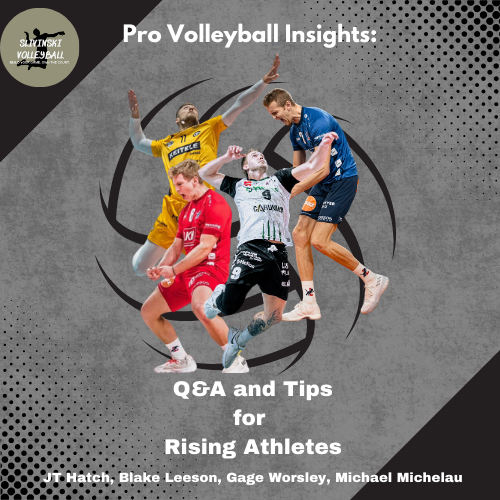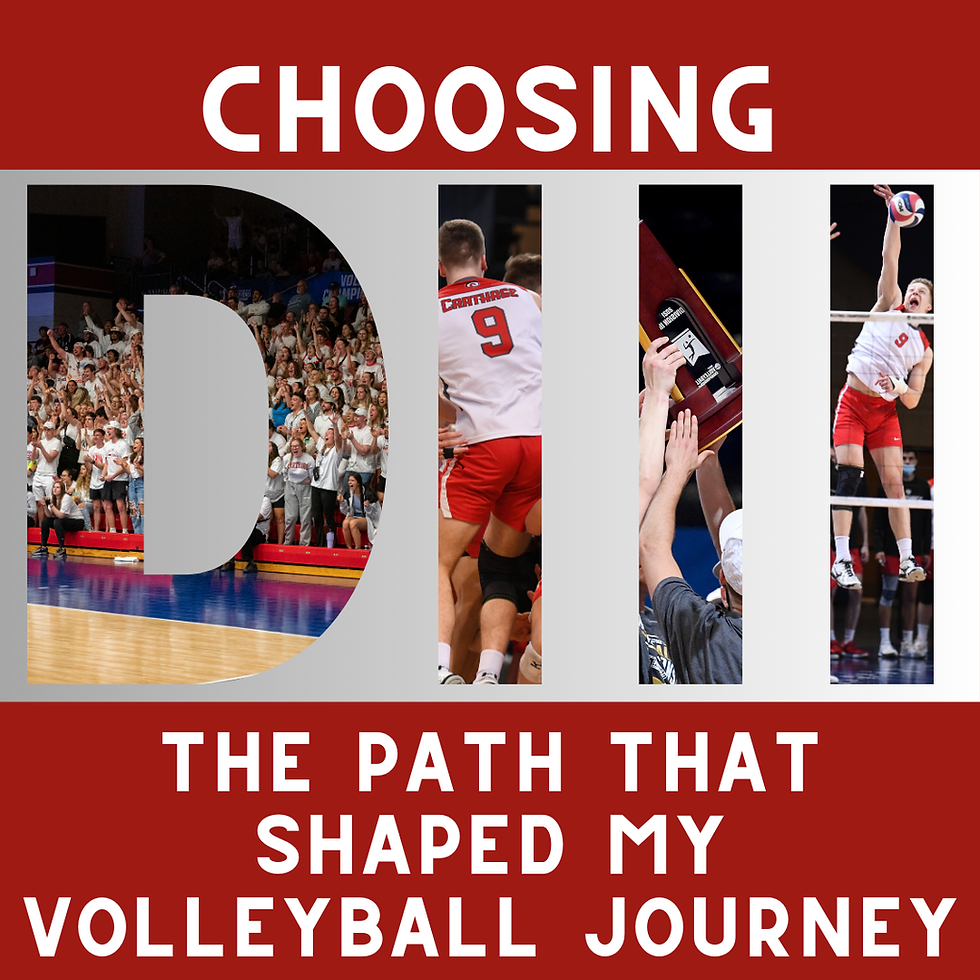Pro Volleyball Insights: Q&A and Tips for Rising Athletes
- Matt Slivinski

- Feb 27
- 7 min read

In the dynamic world of professional volleyball, four American athletes have distinguished themselves on both domestic and international stages: JT Hatch, Blake Leeson, Gage Worsley, and Mike Michelau. Each has showcased exceptional talent and dedication, contributing significantly to their teams' successes across various leagues.
JT Hatch emerged as a formidable outside hitter during his tenure at UCLA, where his performance was instrumental in the team's competitive standing. Transitioning to the professional arena, Hatch has brought his dynamic play to international courts, including notable contributions to Helios Grizzlys Giesen in Germany's Bundesliga. His IQ and stellar serve receive continue to make him a valuable asset in professional volleyball.
Blake Leeson, a standout middle blocker from Ohio State University, has made significant strides in his professional career. Known for his impressive blocking and attacking skills, Leeson has spent the last two years playing for SVG Lüneburg in Germany. His team has just recently made it to the quarterfinals of Champions League.
Gage Worsley, celebrated for his exceptional defensive capabilities as a libero at the University of Hawai'i, has seamlessly transitioned to the professional level. Joining SVG Lüneburg alongside Leeson, Worsley has maintained high standards of play, delivering precise passes and remarkable digs that have been crucial to his team's performance in the German league. On top of that, his brother and him run the highly successful Out Of System Company.
Mike Michelau has demonstrated versatility and scoring ability as an outside hitter since his collegiate days at Erskine College. His professional journey has seen him excel in various European leagues, including a standout tenure with Savo Volley in Finland, where he was instrumental in securing a domestic cup victory. Michelau's offensive strength and experience continue to make him a formidable presence on the court.
Collectively, these athletes exemplify the dedication and skill required to excel in professional volleyball, each bringing unique strengths to their respective teams and leaving a lasting impact on the sport.
Q&A
Question: What advice have you been given as a professional, or during your collegiate career, that you wish you were given in your youth?
JT Hatch:
To be more confident and aggressive with attacking and not worry about making too many mistakes. Discovering your limits and not just playing safe the entire time.
Blake Leeson:
The faster you can forget about your mistakes the faster you can progress. Have short-term memory and don’t hang onto errors. Be more intentional with the process and not the outcome, especially at younger ages.
Gage Worsley:
Mmmm nothing that I was told, but more about what I learned personally.
Mike Michelau:
I wish I had been given more advice about my serve receive techniques and habits. I learned pretty early in my pro career all the bad habits I developed and was never taught or coached differently.
---
Question: If you could go back and change anything about your club volleyball training, having the knowledge you have now, what would that be?
JT Hatch:
Pretty good training at younger ages.. maybe just to be more technical and not get away with only being talented.
Blake Leeson:
Play as much as you can at every position. Play multiple sports as well: The more well-rounded you are, the better you will be down the road. The game is evolving, and being one-dimensional will leave you in the dust.
Gage Worsley:
I would focus more on controlling the "easy" balls in any situation. i.e. free balls, out-of-system setting (would 10000% have worked on that more), and gotten more comfortable with my platform from a younger age.
Mike Michelau:
Tough question, and I can’t really think of an answer for this one. I only played one year of club volleyball, and that was my 18’s year. But I was very lucky with the team I was on because we had great and very competitive trainings.
---
Question: Is there anything you did in college that elevated you over other athletes and got you overseas?
JT Hatch:
Worked on my game IQ and became really solid in a couple of areas that I was great in. Became a leader on the court and someone my teammates could rely on.
Blake Leeson:
Work ethic. Everyone wants to play in college. Everyone wants to play overseas. That’s great to want it. What are you going to do to separate yourself from everyone who wants it too? Saying it is one thing, but do your daily habits follow or embody that same desire?
Gage Worsley:
I would honestly say no. I had a very good team in college, so that in itself made me better. It was always super competitive. I felt behind when I came in and played pro.
Mike Michelau:
I went to a smaller college that wasn’t really known for volleyball (Erskine College). But we still played against the Division 1 schools and usually did well. I had a lot of motivation since we weren’t really known for volleyball, and it always pushed me to work hard and motivate my teammates so that we were able to compete against the bigger schools. A big thing that helped me get more recognition was making the NCAA tournament two times.
---
Question: What is the most important skill for a player to develop if they want to succeed at a higher level?
JT Hatch:
Passing and ball control. The serve and pass game is a significant step up from college, and if you can’t master that or at least be sufficient, then it will be really challenging to succeed. Or, the ability to adapt when one is thrown into adverse situations.
Blake Leeson:
I would say ball control and the ability to adapt and understand different situations. What is the solution or key for that specific situation within the game? The faster you understand these differences, the faster your game will progress. Again, you can’t be one-dimensional.
Gage Worsley:
Mentality. The confidence and mindset to be fine after errors and bad performances. And the mentality to win.
Mike Michelau:
Volleyball skill-specific, it depends on the position, I think. But speaking more as a skill for any athlete, you need to have the motivation to get better every day and have fun doing it! Also, you need to be able to handle failure in the right way. I think it’s a skill to be able to accept failing and then learn from it.
---
Question: What was one of the hardest challenges you faced in your volleyball career, and how did you overcome it?
JT Hatch:
Probably just adjusting to life overseas and how difficult it can be if you aren’t in an ideal situation. Having to find ways to keep yourself motivated when times get rough or you’re not playing at the level you need.
Blake Leeson:
I partially tore my Achilles (75%). I thought that was going to take me out permanently. I would say always get multiple opinions from doctors if you can. Be your own self-advocate, and if you want something or need help, don’t be afraid to ask people around you that you trust to help get you there. After rehabbing and having it in a cast, I worked a lot with a PT and my strength coach to build back up. It helps to have good people in your corner, so make sure that’s the case, but at the end of the day, you have to want to get better and you have to put in the work. Regardless of the situation, people can only help or push you so far.
Gage Worsley:
I lost all confidence in serve receive. I just had to do it more often and fail sooooooo much.
Mike Michelau:
I think the hardest challenge was when I played in Germany and I didn’t get to see the court so much. It was very hard for me because I was never in a situation like that before, and also being away from family didn’t help either. But I just used it as motivation every single day to try and get better and prove myself. Though it was one of the hardest challenges I faced, I think it was one of the best things that happened to me in my career. I learned a lot and matured a lot.
---
Question: What is your best recovery tip?
JT Hatch:
Sleep and sauna.
Blake Leeson:
Nothing fancy…. Sleep and making sure you’re putting back into your body the fuel it burns from playing.
Gage Worsley:
Everything alwaayyssss works its way back. Ruts end. It will all be okay.
Mike Michelau:
STRETCH STRETCH STRETCH!!
---
Question: What’s the most rewarding part of playing at the professional level, and how do you keep your love for the game alive?
JT Hatch:
The best part is making friends and enjoying the culture and life where you live. It really helps making friends with your teammates and spending time together outside of the court. Winning big games always feels pretty good as well!
Blake Leeson:
Being able to still compete alongside some of my best friends and in front of a crowd that really cares about the sport and the community is very special. Not every club and not every player gets that experience. Professional (volleyball) is very different from college in a lot of ways, and there are positives and negatives to everything, but at the end of the day, we are playing a sport. Life is pretty great when you look at it from that perspective.
Gage Worsley:
I love this game, so playing world-class opponents and clubs is something I love so much. I naturally have it. I go home and just play more volleyball. Honestly, living my dream life.
Mike Michelau:
I think the most rewarding thing is to be able to do what you love for a job. I keep my love for the game alive just because I have always been a competitor. I love to compete, and I get to do it every day in practices and in games.
---
Instagram Handle
JT Hatch: @jt.hatch
Blake Leeson: @Blake_leeson
Gage Worsley: @gswizzles6
Mike Michelau: @mike_michelau
Have more questions about Professional Volleyball? Feel free to comment below or reach out to me on Instagram! @Slivinski_Volleyball



Comments